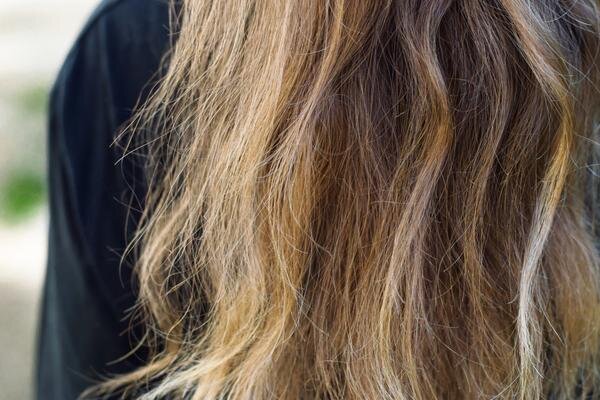Is Protein Good For Hair?
IN THIS ARTICLE
Which hair types need protein shampoo?
Which protein is best for hair health?
Shop for protein shampoo and conditioner
What to expect from a protein shampoo
What about keratin shampoo?
Is protein good for hair or can it cause problems? To clear matters up, we asked Green People UK Cosmetic Scientist Ian Taylor whether he thinks protein shampoo and conditioner is a hair booster or a hindrance to healthy locks.
Here we use his insights to myth-bust some common misconceptions about protein shampoos and explain the benefits of using protein haircare products to restore hair health.
WHICH HAIR TYPES NEED PROTEIN SHAMPOO?
Generally speaking, protein shampoo and conditioner is good for the hair and this is especially true for dry, damaged and frequently dyed hair.
A reparative protein hair care routine would benefit those whose hair has been left dry and brittle as a result of:
Too much expose to heat styling treatments
Perming
Bleach and hair dye
Overuse of these treatments is known to cause damage to the hair shaft structure by breaking the bonds that hold hair fibres together. Such damage leaves hair porous, brittle, frizzy and less effective at holding water but a protein shampoo and conditioner can help to repair this damage and restore hair health.
If you have hair that has been damaged by too much hair dye, heat exposure or over styling, we’d recommend using a hair care routine that blends nourishing actives that restore hair hydration with proteins that adds strength and support to the hair structure.
WHICH PROTEIN IS BEST FOR HAIR HEALTH?
We consider Hydrolysed Quinoa Protein to be the best protein for feeding strength, shine and volume into the hair. Quinoa is a natural grain that’s a complete protein, compatible with the hair and rich in reparative amino acids. The Quinoa grain is also suitable for all hair types, is gluten free, vegan-friendly and contains all 8 essential amino acids needed for healthy hair.
The form of protein we use in our Quinoa protein shampoo and conditioner is Hydrolysed Quinoa. This has been naturally modified to make the protein water-liking and ensure that water and reparative nutrients can be effortlessly absorbed into the hair.
Once this protein penetrates the hair, amino acids work to increase the hairs thickness, structural strength and improve manageability-without blocking other nutrients from entering the hair shaft.
Another reason why we consider Quinoa to be such a good protein for shampoo is that the bonds holding Quinoa protein structures on the surface of hair shafts are easily broken by the foaming agents in shampoo, which means Quinoa shouldn’t build up and weigh down your hair.
SHOP FOR PROTEIN SHAMPOO AND CONDITIONER
The protein hair care routine that we recommend for all hair types is the Quinoa & Artichoke Shampoo followed by the Quinoa & Artichoke Conditioner.
Together they restore luxurious shine manageability to the hair and with regular use, damaged and dry hair will feel softer, thicker, more manageable and less frizzy.
Natural, organic and SLS-free, these are two of our top-selling hair care products.
“The transformation of my hair after using the quinoa & artichoke shampoo and conditioner has been incredible. My often straw-like over bleached blonde hair now feels smooth and toned. It has never felt so good and I cannot rate these products highly enough.” Sara B, UK
QUINOA & ARTICHOKE SHAMPOO 200ml
Restore luxurious shine and vitality for all hair types
QUINOA & ARTICHOKE CONDITIONER 200ml
Get ultra-soft hair with brilliant shine and smoothness
WHAT TO EXPECT FROM A PROTEIN SHAMPOO
A shampoo that’s made with a protein that’s rich in amino acids won’t just cleanse the hair; the amino acids will also help make fine damaged hair thicker, glossier and more manageable.
In addition to using a protein shampoo, those with damaged hair will find that a protein-rich conditioner is especially beneficial for restoring their hair shine and manageability health.
You can apply a protein conditioner to the ends of the hair but if you have damaged or very dry hair you may also wish to consider using our Quinoa & Artichoke Conditioner as a 10-minute weekly hair mask so that its reparative effects are more intense.
WHAT ABOUT KERATIN SHAMPOO?
We’ve heard some rumours of concern about protein overload but this is a bit of a grey area and something that we think needs clarifying.
The results you get from using protein-enriched hair care products will vary depending on the type of product you use and the type of protein used to make your shampoo and conditioner.
For many years hair care products have been sold to counteract hair damage – many of which contain proteins, often in the form of keratin. Hair is largely made of keratin and this hair-compatible shampoo substance is effective at plugging the gaps in the damaged porous hair shaft.
However, whilst keratin can effectively seal over gaps in damaged hair, it is a hydrophobic protein and resistant to water.
If too much keratin builds up on the hair it can mean that water is unable penetrate the hair shaft and could lead to dryness and an increased risk of hair breakage.
Hydrolysed quinoa does not have the same effect and this is one of the reasons why we use this natural ingredient to make our protein hair products.
Those who need a cruelty-free, vegan shampoo and conditioner should also avoid keratin hair treatments. We’re happy to say that quinoa is a plant-based, ethical alternative.
Credit: Green People UK Protein shampoo & conditioner – is protein good for hair?




